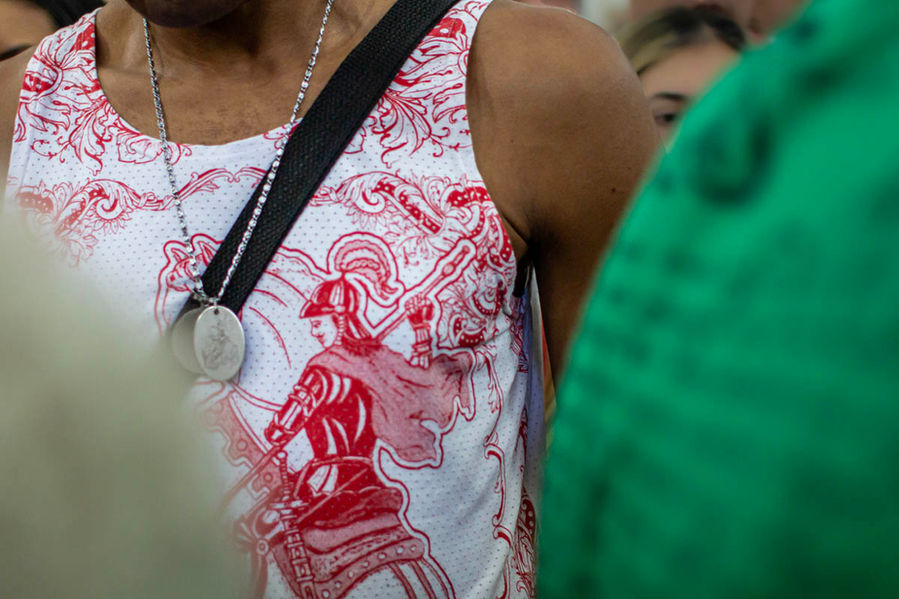FEEL
THE VIBE
The captain marches ahead of the group. The saraipora follows close behind him, carrying the Çairé, a beautiful vine frame covered with colored ribbons. Along with them, go the lieutenant, the male judge, the female judge, the male prosecutor, the female prosecutor, the troneira, the girls from the ribbons and a lot of citizens of Alter do Chão and tourists.
The drummers play lively songs of praise during the procession. The main objective of this tradition is to take the heavy masts from Praia do Cajueiro to Praça do Çairódromo.
The male judge's pole – where the white flag with the red dove will be hoisted – is carried by the male butlers, all wearing green shirts. The female judge's flagpole - red with the white dove - is carried by the female butlers, all wearing red shirts.
When they arrive at the square, the population is divided: men on one side, women on the other. Each group will be responsible for decorating their pole with leaves and fruits.
After 5 days, of many prayers, meetings and communitary meals, the day for the mast to be knocked down arrives. Those who feel like it can try climbing the long wooden logs. Alongside the banners of the Divine, a prize awaits the adventurer who makes it to the top first. On the way between earth and sky, he unties the fruits and shares the bounty with the population.
When the flags have been brought back to the male anda female judges, there will be no more fruit, no more prizes. A fierce competition then begins between men and women who, with axes, knock down the mast and mark the end of that year's cycle of celebrations.
PHOTOS
ORAÇÃO
“Eu andarei vestido e armado com as armas de São Jorge
Para que meus inimigos, tendo pés não me alcancem,
Tendo mãos não me peguem,
Tendo olhos não me vejam,
E nem em pensamentos eles possam me fazer mal.
Armas de fogo, o meu corpo, não alcançarão,
Facas e lanças se quebrem sem o meu corpo tocar,
Cordas e correntes se arrebentem sem o meu corpo amarrar.
Jesus Cristo, Me proteja e me defenda com o poder de sua santa e divina graça,
Virgem de Nazaré, me cubra com o seu manto sagrado e divino,
Protegendo-me em todas as minhas dores e aflições,
E Deus, com sua divina misericórdia e grande poder,
Seja meu defensor contra as maldades e perseguições dos meu inimigos.
Glorioso São Jorge, em nome de Deus,
Estenda-me o seu escudo e as suas poderosas armas,
Defendendo-me com a sua força e com a sua grandeza,
E que debaixo das patas de seu fiel ginete
Meus inimigos fiquem humildes e submissos a vós.
Assim seja com o poder de Deus, de Jesus e da falange do Divino Espírito Santo.
São Jorge Rogai por Nós.
Amém.”
FLAVORS
Tarubá is a milky and slightly sweet drink, widely consumed by the indigenous populations of Pará.
The very laborious preparation process begins with the extraction of tucupi (a sauce obtained by crushing manioc). Then, the beiju dough is formed. After roasting, the beiju is placed on palm leaves, wetted with water, sprinkled with green leaves of curumi or curumin-caá (ravenala guaianensis) and covered again with palm leaves. During the process of resting the dough, which lasts several days, fermentation takes place that transforms the common drink (consumed on a daily basis as a fortifier) into an alcoholic drink, more consumed on feast days.













